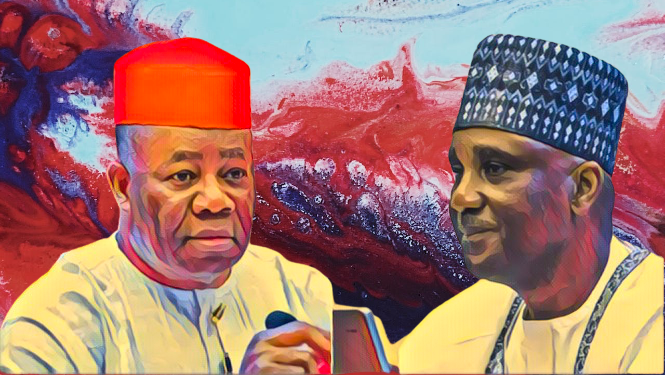The Socio-Economic Rights and Accountability Project (SERAP), a prominent non-governmental organization, has made a significant move by urging the leadership of Nigeria’s National Assembly – Senate President Godswill Akpabio and Speaker of the House of Representatives Tajudeen Abbas – to consider a substantial reduction in their N344.85 billion budget. This call, made in light of the current economic struggles facing the country, aims to trim the cost of governance and align public spending with the nation’s fiscal realities.
In a detailed letter penned by SERAP’s Deputy Director, Kolawole Oluwadare, the organization implored Akpabio and Abbas to collaborate with President Bola Tinubu in drafting and presenting a revised supplementary appropriation bill. This bill would ideally reflect a downsized budget for the National Assembly, a move that SERAP believes is crucial in the current economic climate.
The letter also emphasized the need for transparency in the National Assembly’s expenditure. SERAP specifically requested the publication of detailed spending plans, including the controversial allocations of N3 billion for the Senate Car Park and an equal amount for the House of Representatives Car Park. This demand for openness is rooted in a broader call for accountability in the management of public funds, especially in a period of economic austerity.
SERAP’s communication highlighted that the passage of appropriation bills that are misaligned with the Nigerian Constitution’s provisions constitutes a breach of the lawmakers’ constitutional oath of office. The organization expressed concern over the fiscal consequences of such discrepancies, particularly in exacerbating Nigeria’s debt crisis.
The unilateral and self-serving nature of the budget increase, according to SERAP, contradicts the principles of separation of powers, checks and balances, and the rule of law. The body underscored that this increase has raised legitimate concerns among the Nigerian populace regarding the lawmakers’ stewardship of the national commonwealth.
In its argument, SERAP stressed that the National Assembly, as a key governmental institution, bears the responsibility of embodying public interest and responsiveness. The organization pointed out that effectively exercising oversight functions and holding the government accountable are contingent upon the National Assembly’s commitment to curbing wasteful and abusive spending within its ranks.
Reducing the National Assembly’s N344.48 billion budget, SERAP argued, would align with the lawmakers’ oath of office and the spirit of the Nigerian Constitution. Such a reduction, the organization notes, would promote efficient, honest, and legal expenditure of public funds, thereby serving the public interest and enhancing confidence in the legislative body.
Furthermore, SERAP urged the National Assembly leaders to provide clarity on the N8.5 billion earmarked for ‘National Assembly liabilities.’ The organization seeks detailed information on the nature of these liabilities, including how and why they were incurred, to ensure transparency and accountability.
The N344.48 billion budget allocation to the National Assembly, an increase of approximately N147 billion from previous years, represents the highest-ever budgetary allocation to the legislative body. This substantial increase has sparked widespread debate and scrutiny, particularly in light of Nigeria’s challenging economic environment.
SERAP’s call for a budget reduction and increased transparency represents a critical step in advocating for fiscal responsibility and accountability in Nigeria’s governance. The organization’s actions are a reflection of the growing public demand for prudent management of public resources and a commitment to the principles of good governance.



